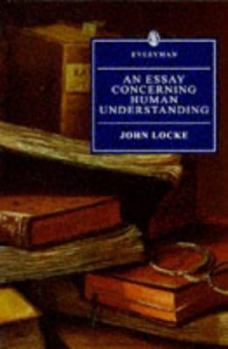Essay Concerning Human Understanding
Select Format
Select Condition 
Book Overview
In An Essay Concerning Human Understanding, first published in 1690, John Locke (1632 1704) provides a complete account of how we acquire everyday, mathematical, natural scientific, religious and... This description may be from another edition of this product.
Format:Paperback
Language:English
ISBN:0460873555
ISBN13:9780460873550
Release Date:January 1993
Publisher:Orion Publishing Group
Length:451 Pages
Weight:0.75 lbs.
Dimensions:1.1" x 5.1" x 7.8"
Customer Reviews
4 ratings
Worth Re-Cognising
Published by Thriftbooks.com User , 21 years ago
Any search for this text will result in a plethora of commentaries upon it, whilst it itself seems almost doomed to take second place. The importance of this work to philosophy cannot be underestimated; Descartes is held in common perception to be the figure who changed the course of philosophy. Whilst it is true he may have dipped his toes in uncharted waters, Locke was the first to plunge in. Here we find human understanding stripped to its first principles and from there rebuilt in such a fashion as to purge the presumptions of our age. Locke recommends modesty to the philosopher and thinker throughout and in our current times this message might need restated. In a world, which owes so much to the United States Constitution, it would be appropriate for us all to see what it owed its own origins to and be recalled to values of liberty, modesty and reason in a way which does not rush headlong into a catastrophe of pride.
Outstanding work from a Giant of a Mind.
Published by Thriftbooks.com User , 21 years ago
The most important book in the History of Western Philosophy. Anyone wishing to understand the western tradition will have to grapple with this work eventually.Its not that Locke got everything right, but he does at least point us in the right direction.
Locked Into Reason 18th Century Style
Published by Thriftbooks.com User , 22 years ago
John Locke's 1698 "Essay Concerning Human Understanding" is one of the foundational texts of Western philosophy. It is a phenomenal enquiry into how and why people become functional individuals. Bringing into philosophy a developmental model of personal becoming, Locke drilled pre-Berkeleyan common sense into a growing capitalist nation, one which was already moving away from the absolutist model of government and viewing self in the world espoused by Thomas Hobbes in "Leviathan." While clearly building on and stepping on his predecessors, most notably Hobbes and Rene Descartes, Locke deals broadly with ideas, language, and how people come into knowledge, and sets the stage for a new phase of philosophy entering the 18th century. Locke begins the "Essay" by rejecting and dispensing with the notion of "innate ideas," which basically says that we are born in possession of certain principles, elements of knowledge, or maxims that help us orient ourselves in the world. Through long and drawn out (one downside of Locke is his insistency on detail and repetition) examples and arguments, he attempts to prove that when we are born, we have absolutely nothing intelligence-wise, to recommend us. This is what is popularly referred to as the 'tabula rasa' theory, that when first born, our minds are like "empty cabinets" or "white sheets" of paper - which experience and experience only furnishes with our ideas about the world. His goal here is to get people to question their assumptions about the world, to ask questions and decide for themselves based on reason and experience, how best to interact with the world. Locke says that the only two sources of all human knowledge are sensation (that information which is passively thrust upon our senses) and reflection (when we consider and think about that sense data, and about our own thoughts). From these "simple ideas," we are able to combine and recombine thoughts to form "complex ideas" and use clear and distinct language to express them to other people. This social aspect of this philosophy is something that really fascinated me about Locke. While focusing on the individual's growing base of knowledge, he is all the while trying to orient people to functioning in society. Saying that the end of all knowledge serves two purposes, viz., honouring God, and being morally responsible, Locke goes on to show how human life often works counter to these goals, with a view to correcting them. Another of his famous formulations, one all too familiar to Americans, as part of our national idealism, is that the basic state of nature of humanity consists in the "pursuit of happiness." Compared to Hobbes, for whom the state of nature consisted in the attempt to attain greater and greater power over others, Locke's state of nature seems relatively benign - however, he goes to great lengths to show how the pursuit of happiness often leads to reckless and wanton behaviours, ultimately destructive both to self and soc
I Already Knew That
Published by Thriftbooks.com User , 25 years ago
The highest compliment I can pay this book is the fact that throughout my entire reading I found myself repeating (in my mind), "I already knew that!" This is evidence of how influential Locke's philosophy has been on our present-day understanding of human nature. Also, aesthetically, the book was enjoyable because of its "courtly" English.






